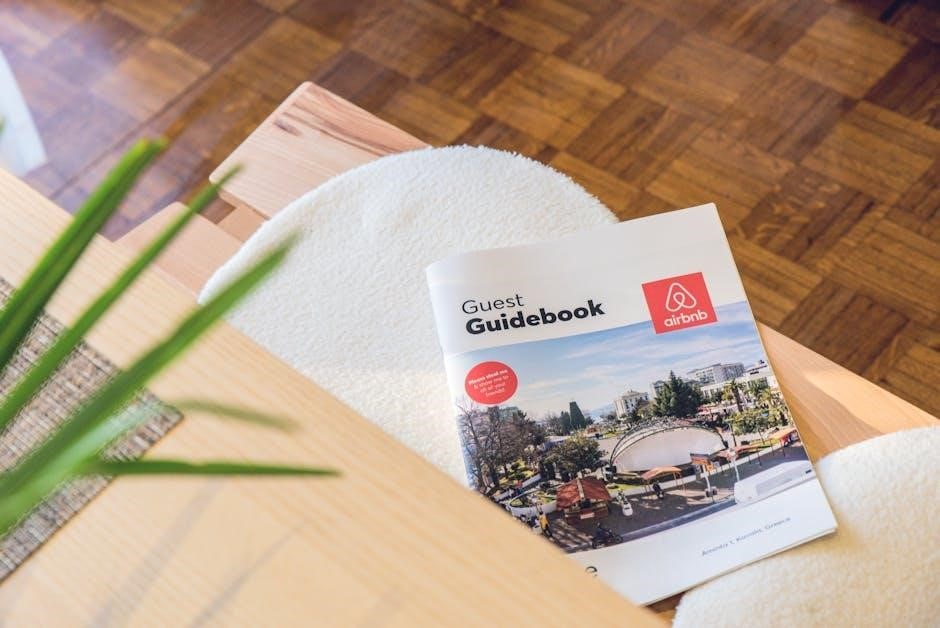Crossword clues are hints that lead to specific answers, often involving wordplay or straightforward definitions. The “guide” clue, for example, might hint at a tour guide or manual.
1.1 What Are Crossword Clues?
Crossword clues are hints designed to guide solvers to specific answers. They can be straightforward or involve wordplay, anagrams, or cryptic references. For example, the clue “guide” might lead to answers like “manual” or “tour guide.” Clues often appear in two forms: quick clues, which are direct, and cryptic clues, which use wordplay. They are essential for navigating the puzzle grid, providing both challenge and enjoyment for solvers. Understanding clues is the first step to mastering crosswords, as they set the foundation for solving the entire puzzle effectively.
1.2 Importance of Clues in Crossword Puzzles
Crossword clues are vital as they provide the necessary hints to solve the puzzle. They add challenge and engagement, making crosswords enjoyable and mentally stimulating. Clues guide solvers through the grid, ensuring each answer fits logically. Without clues, the puzzle would lack direction and purpose. They also cater to different skill levels, offering both simple and complex challenges. Importantly, clues ensure that each crossword is unique, preventing repetition and keeping the game fresh for enthusiasts. Thus, clues are the heartbeat of crossword puzzles, driving both fun and intellectual growth.

Understanding Different Types of Crossword Clues
Crossword clues vary in style, from straightforward definitions to complex wordplay. They cater to different skill levels, enhancing the puzzle’s appeal for both beginners and experts.
2.1 Quick Clues
Quick clues are straightforward and direct, often providing clear definitions or synonyms. For example, the clue “guide” might directly lead to “manual” or “tour guide.” These clues are designed to be solved quickly, serving as entry points for solvers. They typically avoid complex wordplay, focusing on simplicity. Quick clues are essential in crosswords as they build momentum and provide a sense of progress. They are particularly helpful for newcomers, allowing them to gain confidence before tackling more challenging clues. Quick clues ensure a smooth start to the puzzle-solving experience.
2.2 Cryptic Clues
Cryptic clues involve wordplay, requiring solvers to decipher hidden meanings. For example, “guide” might appear in a clue like “Tour guide’s manual,” hinting at a pun or double definition. These clues often combine anagrams, charades, or reversals, challenging solvers to think creatively. Cryptic clues are popular in British crosswords and demand a deep understanding of wordplay rules. They offer a unique puzzle-solving experience, blending logic with linguistic ingenuity. Mastering cryptic clues enhances one’s ability to decode complex wordplay, making them a favorite among experienced enthusiasts.
2.3 Anagrams and Other Wordplay Clues
Anagrams are a common form of wordplay in crossword clues, where letters are rearranged to form a new word. For example, “listen” can become “silent.” Other wordplay includes charades, where words are combined or split, and container clues, where one word is placed inside another. These clues challenge solvers to think creatively and decode hidden patterns. Anagrams and wordplay add complexity and fun to crosswords, requiring solvers to think outside the box and explore multiple interpretations of the clue. They are a key element in making crosswords engaging and intellectually stimulating.

Strategies for Solving Crossword Clues
Begin with straightforward clues, utilize wordplay techniques, and cross-reference across and down clues. Check for common patterns and use online tools. Join communities for tips and efficiently solve crosswords.
3.1 Starting with Easy Clues
Starting with easy clues helps build momentum and provides a foundation for solving the rest of the puzzle. Look for short answers and common words. For example, the clue “guide” might lead to “map” or “mentor.” Filling in these answers first makes it easier to tackle harder clues later. Use online tools or dictionaries if needed, and join crossword communities for additional tips and strategies. This approach ensures a smooth and enjoyable solving experience, especially for beginners.
3.2 Using Wordplay Techniques
Wordplay is a key aspect of crossword clues, often requiring creative thinking. For the “guide” clue, consider anagrams or double meanings. For example, “guide” might hint at “tour guide” or “manual;” Pay attention to homophones or hidden meanings within words. Online tools and crossword communities can help identify patterns. Practice recognizing wordplay techniques to enhance your solving skills. Stay patient and observant, as these clues often require a fresh perspective to unravel their clever twists.
3;3 Cross-Referencing Across and Down Clues
Cross-referencing Across and Down clues is a powerful strategy for solving crosswords. By identifying overlapping letters between clues, you can narrow down possibilities. For example, if “guide” is an Across clue, look at the Down clues intersecting with its letters to find common ground. This method helps confirm answers and fills in gaps efficiently. Start with easier clues to build momentum, then use their answers to unlock tougher ones; Online tools and dictionaries can further aid in verifying your solutions, ensuring accuracy as you progress through the puzzle.

Common Themes and Patterns in Crossword Clues
Crossword clues often follow themes like seasons, events, or wordplay. “Guide” might relate to travel or instruction, fitting into broader puzzle motifs. This structure enhances solvability and engagement.
4.1 Themed Crosswords
Themed crosswords often revolve around a central idea or subject, such as movies, history, or holidays. Clues like “guide” may fit into travel or instructional themes, enhancing the puzzle’s coherence. For instance, “guide” could hint at a travel guide or a instructional manual, aligning with the theme. This approach makes crosswords more engaging and solvable, as themes provide context for seemingly ambiguous clues. Themed puzzles also encourage creative cluing, making them a popular choice for constructors and solvers alike. They add an extra layer of challenge and fun to the traditional crossword format.
4.2 Repeated Word Patterns
Repeated word patterns are common in crosswords, where certain words or structures appear frequently. The clue “guide” often appears in puzzles, typically hinting at a leader or directory. For example, “travel guide” or “user guide” are common answers. These patterns help solvers recognize familiar clues, making puzzles more approachable. Constructors use such repetition to create a balance between challenge and solvability. Recognizing these patterns can significantly improve solving efficiency, especially for those new to crosswords. This consistency is a key feature of both themed and general crosswords, aiding in the steady progression through the puzzle grid.
4.3 Seasonal and Event-Based Clues
Seasonal and event-based clues add a timely twist to crosswords, often referencing holidays, sports events, or cultural celebrations. For example, a “guide” clue might relate to a holiday gift guide or a New Year’s resolution guide. These clues keep puzzles fresh and engaging, as they tie into current events or traditions. Constructors use seasonal themes to create a sense of relevance, making crosswords more enjoyable for solvers. Such clues also encourage solvers to think creatively, connecting words to specific contexts or occasions, enhancing the puzzle-solving experience with a touch of real-world connection.

Tools and Resources for Solving Crossword Clues
Online crossword solvers, dictionaries, and thesauruses are essential tools for solving clues. Communities and forums also provide valuable insights, helping solvers crack tricky clues like “guide.”
5.1 Online Crossword Solvers
Online crossword solvers are invaluable tools for deciphering tricky clues, including “guide.” These platforms use vast databases to quickly identify potential answers, saving time and frustration. Many solvers offer advanced search features, allowing users to input partial answers or clues, making them indispensable for puzzlers; Additionally, they often provide hints and explanations, helping solvers understand how answers are derived. For instance, typing “guide” might reveal answers like “manual” or “escort,” along with example clues. These tools are especially useful for beginners and experts alike, enhancing the solving experience and fostering learning.
5.2 Dictionary and Thesaurus Usage
Dictionaries and thesauruses are essential tools for solving crossword clues like “guide.” They help define unfamiliar words and provide synonyms, leading to potential answers. For example, a dictionary can clarify that “guide” refers to a person who directs others or a manual for instructions. A thesaurus might suggest synonyms like “manual” or “tour guide,” broadening the scope of possible answers. These resources are particularly useful when clues involve wordplay or less common terms, ensuring solvers understand meanings and context accurately.
5.4 Crossword Communities and Forums
Crossword communities and forums are invaluable for solvers, offering a space to share tips and strategies. Enthusiasts gather to discuss clues like “guide,” exchanging insights and solutions. These platforms often host live events, such as Daily Crossword Live, where participants solve puzzles together. Forums also provide access to expert advice, helping solvers refine their skills and understand complex clues. By fostering collaboration and camaraderie, these communities enhance the overall crossword-solving experience, making it both educational and enjoyable for participants of all skill levels.

Advanced Techniques for Expert Solvers
Expert solvers master hidden meanings and wordplay, often solving clues like “guide” by identifying double definitions or anagrams, ensuring efficient and accurate crossword completion.
6.1 Identifying Hidden Meanings
Identifying hidden meanings in crossword clues requires skill and practice. For the clue “guide,” experts might recognize it as a double definition, referring to both a person leading a tour and a manual or instruction book. This advanced technique involves understanding that a single word can carry multiple interpretations, often revealed through subtle wordplay or context. Mastering this skill allows solvers to tackle complex puzzles efficiently and accurately, making them proficient in deciphering even the most challenging clues.
6.2 Mastering Cryptic Crossword Rules
Cryptic crossword clues rely on specific rules, including double definitions, anagrams, and hidden words. For “guide,” solvers must recognize it as both a person leading others and a manual. These clues often use indicators like “inside” or “around” to signal wordplay. Understanding these rules is essential for solving cryptic crosswords efficiently. Experts recommend studying common patterns and practicing regularly to decode hidden meanings and wordplay techniques effectively. This mastery elevates solving skills and enhances the overall puzzle-solving experience.
6.3 Solving Crosswords Efficiently
Efficiency in solving crosswords involves starting with easy clues to build momentum. Use wordplay techniques like anagrams and cross-references to unlock harder answers. Prioritize clues with unique letters and check for common patterns. Dictionaries and online tools can verify uncertain answers quickly. Skilled solvers often fill in obvious words first, then tackle tougher clues systematically. Regular practice enhances speed and accuracy, making the process more enjoyable and productive. By mastering these strategies, solvers can efficiently complete even the most challenging puzzles with confidence and precision.

Examples of Common Crossword Clues
Common clues include “Guide,” which might hint at a manual or leader. Others involve wordplay like anagrams or puns, such as “Flower that’s also a girl’s name.”
7.1 “Guide” as a Crossword Clue
The clue “Guide” can lead to various answers, such as “manual” or “tour guide.” It might also hint at verbs like “direct” or “steer.” In some cases, wordplay is involved, like “leader” or “advisor.” This versatility makes it a popular clue in puzzles, challenging solvers to think creatively. For example, “Guide” could also refer to “usher” or “pilot,” depending on the context. Its broad meaning ensures it remains a common and engaging clue in crosswords.
7.2 Clues Involving Wordplay
Clues involving wordplay challenge solvers with clever twists, such as anagrams or double meanings. For example, “listen” and “silent” are anagrams, while “bank” can mean a river edge or financial institution. These clues require creative thinking and attention to detail. Wordplay often involves puns, homophones, or hidden meanings, making puzzles more engaging. In themed crosswords, wordplay might align with the puzzle’s theme, adding an extra layer of complexity and fun. These clues test solvers’ ability to think outside the box and interpret hints in unconventional ways.
7.3 Real-World Examples from Puzzles
Real-world crossword clues often provide practical examples of how wordplay works. For instance, the clue “Bulk breakfast purchase” might lead to “cereal,” guiding solvers to think about common breakfast items. Another example is “Flowing river’s edge,” which could hint at “bank.” These clues are designed to test solvers’ ability to connect seemingly unrelated concepts. Puzzles like those in The New York Times or themed crosswords often include such examples, showcasing how wordplay can be both challenging and fun. These examples help solvers understand how clues are constructed and how to approach them systematically.
Mastering crossword clues is a skill that combines logic, vocabulary, and creativity. Solving them brings satisfaction and joy, encouraging continuous learning and improvement for enthusiasts worldwide.
8.1 Final Tips for Crossword Enthusiasts
Start with easier clues to build momentum, then tackle tougher ones. Use dictionaries and online tools for unfamiliar words. Practice regularly to sharpen your wordplay skills. Join crossword communities for tips and inspiration. Embrace challenges and enjoy the process of learning and improving. Remember, crossword puzzles are both a test of knowledge and a source of entertainment. Happy solving!
8.2 The Joy of Solving Crossword Clues
Solving crossword clues offers a unique blend of challenge and satisfaction. It sharpens your mind and expands your vocabulary. The “guide” clue, for instance, might lead you to think creatively about different meanings of the word. Each solved clue brings a sense of accomplishment and keeps your brain active. Whether you’re a casual solver or a seasoned expert, the joy lies in the journey of discovery and the thrill of uncovering hidden meanings within the clues.
8.3 Continuous Learning and Improvement
Solving crossword clues fosters continuous learning and improvement, as each puzzle introduces new words and strategies. The “guide” clue, for example, might teach you about different types of guides, from tour guides to instruction manuals. Regular practice enhances vocabulary and sharpens analytical skills. Engaging with crossword communities and using online tools can further refine your techniques. Embrace challenges as opportunities to grow, and remember that every solved clue brings you closer to mastering the art of crossword solving.
